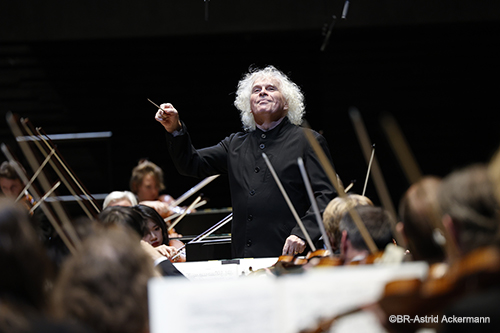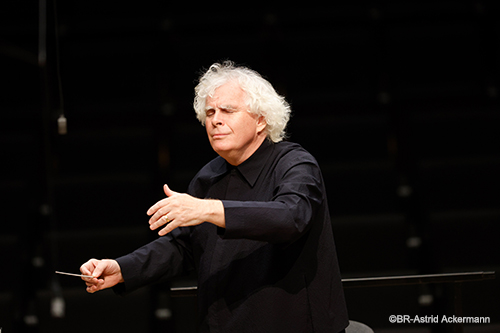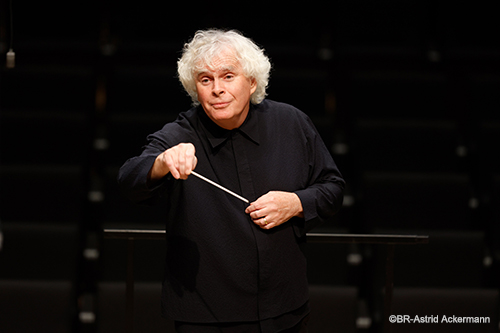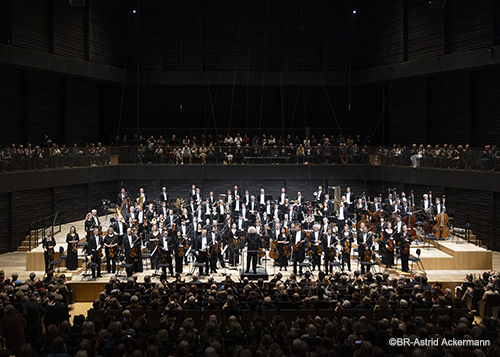2024/11/14
ニュース
Sir Simon Rattle conducted the Symphonieorchester des Bayerischen Rundfunks: Gustav Mahler’s Symphony No.7! – from Munich –
At Munich, IsarPhilharmonie on November 8, 2024
Munich, IsarPhilharmonie
November 8, 2024
Harrison Birtwistle: Donum Simoni MMXVIII for wind instruments and percussion
Gustav Mahler: Symphony No.7
The Symphonieorchester des Bayerischen Rundfunks, Sir Simon Rattle(Conductor)
Antoine Lévy-Leboyer
It seems that Simon Rattle, not yet knighted at the time, first performed Mahler’s 7th Symphony in Birmingham as early as in 1980. For younger generation, this was likely to have been a bold move. At this time, orchestras were not as familiar with Mahler’s music as they are today so this might have been a taxing task. Furthermore, musicians tend to look down this Symphony as not in the same league as the Second Resurrection or the 9th.
This is not the case with Rattle, who has championed it on multiple occasions and toured with it with the City of Birmingham Symphony Orchestra. He has also conducted it as a visiting conductor with orchestras like the Vienna Philharmonic in the 1990s, the Boston Symphony in 1991, and of course with the Berlin Philharmonic Orchestra.
There are strong reasons for his affinity with this work. It is objectively not as organic a Symphony as the Sixth or the Ninth, where a sense of architecture is key to understanding and playing the work. It is a much more radical work with surprises in nearly every bar, whose tonality is ambiguous apart from the glorious C major finale, and where continuity is less important. Mahler himself did not endorse the subtitle “Song of the Night,” which in a way trivializes the music and makes audiences believe this is “easy” programmatic music. It is no wonder that conductors like Pierre Boulez, who excelled in modern music, performed it often, rather than those who revel in drawing lush, Richard Strauss-like sounds from their orchestras.
Since his arrival in Munich, Rattle has revisited some of Mahler’s works and seems to have started what appears to be a new recording cycle. There was indeed a sea of microphones above the stage, as was the case in previous seasons when the Ninth and Sixth were performed. Judging from yesterday’s performance, we can expect something special. Mahler is probably a composer where Rattle’s style has evolved and where he can take full advantage of the forces he now has in Munich.
Tempi were slightly swifter than in earlier readings, yet orchestral colors and articulation were not compromised. The harmonic textures at the beginning of the first movement had richness and depth with strong contributions from Lukas Gassner on the tenor horn. There was a subtle accelerando before the recapitulation in the closing pages that was very effective. The first Nachtmusik was edgy with marvelous contributions from Stefan Schilling on clarinet and Pascal Deuber on horn. The duo between these two instruments was splendid. The Scherzo was spooky with fine solo contributions from Hermann Mennighaus on viola. The Second Nachtmusik was an opportunity for the Konzertmeister Radoslaw Szulc to shine, and the strings could display a wide dynamic range. Rattle made us frequently aware of how well Mahler writes for the double basses, who seemed to enjoy every opportunity they had to play varied expressive music. And as we are in Bavaria, the Meistersinger-ish Rondo finale had communicative joy, reminding us that we are just a mere month from Oktoberfest.
At Munich, IsarPhilharmonie on November 8, 2024
“Donum Simoni MMXVIII” by Harrison Birtwistle, which preceded the Symphony, was an interesting piece for woodwinds, brass, and percussion. In a short amount of time, this work written for Sir Simon, Birtwistle shows us how it is possible to write in such a variety of styles for 25 musicians. In many ways, this was a fitting prelude to the many unexpected ranges of sound worlds in the Mahler.
Rattle conducted without a score, displaying complete mastery of the work. Audience reception was tremendous. Rattle always asks individual contributors to stand, but this time went to their desks to shake hands with them. While waiting for the metro, some musicians confirmed how much they had enjoyed themselves.
Rattle and his musicians with no less than Seong-Jin Cho, will soon be in Asia for a tour that will present music of Brahms, Bruckner, Wagner, Webern, Ligeti and this very program. Do not miss it. How often can one hear the combination of an outstanding orchestra and a conductor that can bring many years of experience probing such a masterful work?
Fuji Electric Super Concert
Sir Simon Rattle, Chefdirigent, Symphonieorchester des Bayerischen Rundfunks
https://www.japanarts.co.jp/concert/p2087/
7:00p.m., Tuesday, November 26, 2024 at Suntory Hall(Sold out)
Brahms: Piano concerto No.2 in B-flat Major Op.83 [Piano: Seong-Jin Cho]
Brahms: Symphony No.2 in D Major Op.73
7:00p.m., Wednesday, November 27, 2024 at Suntory Hall(Few seats remaining)
Ligeti: Atmosphères
Wagner: Lohengrin “Prelude to Act1”
Webern: Six pieces for orchestra Op.6
Wagner: Tristan and Isolde “Prelude”, “Isoldes liebestod”
Bruckner: Symphony No.9 (Cohrs critical edition)







